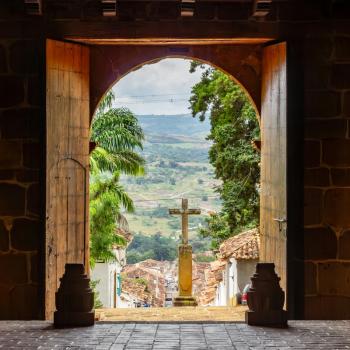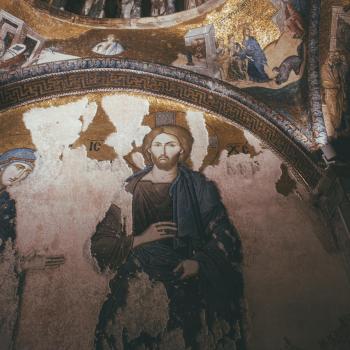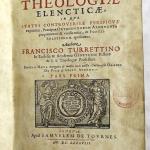 The Second Sunday of Great Lent, the Sunday of St Gregory Palamas, is often considered the second Sunday of Orthodoxy.[1] Mystical theology, central to the Eastern religious life, is brought to the forefront, because dogmatics is not meant to lead merely to speculative, abstract thought. It is supposed to be the authentic interpretation of and explanation for the historical Christian experience. That is, the East sees “Living religious experience as the sole legitimate way to gain knowledge of the dogmas,” as Pavel Florensky declares in his magnum opus.[2] Since St Gregory Palamas was the great defender of the Eastern spiritual experience, hesychasm, it is understandable why this celebration is seen as a continuation of the triumph of orthodoxy. Palamas can be seen to be a theologian par excellence; his work was not the creation of vacuous words about God, but the presentation of his inner dialogue with God. Theology proper to him was not found in academic treatises which show off one’s education, but in the wisdom one gained from God.[3]
The Second Sunday of Great Lent, the Sunday of St Gregory Palamas, is often considered the second Sunday of Orthodoxy.[1] Mystical theology, central to the Eastern religious life, is brought to the forefront, because dogmatics is not meant to lead merely to speculative, abstract thought. It is supposed to be the authentic interpretation of and explanation for the historical Christian experience. That is, the East sees “Living religious experience as the sole legitimate way to gain knowledge of the dogmas,” as Pavel Florensky declares in his magnum opus.[2] Since St Gregory Palamas was the great defender of the Eastern spiritual experience, hesychasm, it is understandable why this celebration is seen as a continuation of the triumph of orthodoxy. Palamas can be seen to be a theologian par excellence; his work was not the creation of vacuous words about God, but the presentation of his inner dialogue with God. Theology proper to him was not found in academic treatises which show off one’s education, but in the wisdom one gained from God.[3]
O light of Orthodoxy, teacher of the Church, its confirmation, O ideal of monks and invincible champion of theologians, O wonder-working Gregory, glory of Thessalonica and preacher of grace, Always intercede before the Lord that our souls may be saved (Troparion of St Gregory Palamas Sunday).
If one who had never heard of St Gregory Palamas decided to look him up and read his biography, one of the first things they will note is that he lived in the 14th century (1296 – 1359), long after 1054, the date routinely used to express the foundation of “The Great Schism.” It is clear from his life, he had serious concerns with Western scholastic theology, and, like the many in the Orthodox Church, opposed reunion with Rome if it meant sacrificing the Eastern dogmatic tradition to do so.[4] So how can he be seen, as he is, as a saint in the Catholic Church? One answer, which follows with contemporary research, is that 1054, while representing a breach between Rome and Constantinople, cannot be seen as the date when the schism was finalized.[5] After 1054, Greeks were known to receive communion when in Western lands, and Latins while in the East. For this reason, the ecclesial situation could be better described at this time as one of “imperfect communion,” a status given the irregular relationship between Constantinople and Rome. We find that, after 1054, other Easterners, such as St. Sergius of Radonezh, were recognized as saints in the West, so this honor is not exclusively given to Palamas.[6] Indeed, whatever ecclesial difficulties existed between Rome and Constantinople, it is recognized that the situation differed greatly from other schisms and heresies, and both sides of the divide could, and did, produce saints.[7]
Gregory was born to a well-to-do Byzantine family; he was given his education in the court of Emperor Andronicus II Paleologus, who, it is said, saw great potential in him, and wanted to make sure he would have the opportunities he needed to achieve greatness. After Gregory’s father died, he had been given the task to watch over and take care of his family: his mother, two brothers, two sisters, and their servants. When, around twenty years old, he discovered his monastic vocation, he convinced his family that they should follow him into the monastic life, which meant they would be safe, and his familial obligations would be fulfilled. He became a monk at Mt Athos, where he learned and practiced the rigorous spiritual discipline advanced by its leaders — hesychasm. He was able to take on the life of a monk for several years, before he, and others with him, would be forced to flee the monastery (it was attacked by Turkish raiders); initially, his band of monks hoped to go on pilgrimage to the Holy Land, but he found his journey diverted at Thessalonika, where he joined himself to a community, and was ordained a priest. A few years later, he was to return to Mt Athos, joining the St Sabbas hermitage around 1331. At the end of that decade, he would be engaged in debate with Barlaam (and Barlaam’s supporters) on the nature of hesychasm, proclaiming not only our ability to experience God in our lives, but to know God through that experience. The controversy resulted in three major councils, the most important being the third in 1351, because it produced a Tome which ratified Gregory’s teaching and was, from that time on, used in the Synodikon of Orthodoxy. Before that council, in 1347, Gregory had been elevated to Archbishop of Thessalonika; it was in that capacity, being captured in a voyage at sea by Turks, he resided in Asia Minor for a year. He was shown great respect by his captors. Instead of being mistreated, he was given much freedom, allowing him to explore the religious beliefs of Islam (which he took an interest in), and to debate in favor of the Christian faith with prominent Muslim scholars and officials without risk to his life. He died on November 27, 1359. It was only a few years later, in 1368, when St Gregory Palamas was canonized. At the time of his canonization, the Second Sunday of Lent became Gregory Palamas Sunday, because his work was seen as defending the spiritual life orthodoxy was meant to bring to all.
Holy and divine instrument of wisdom, joyful trumpet of theology, together we sing your praises, O God-inspired Gregory. Since you now stand before the Original Mind, guide our minds to Him, O Father, So that we may sing to you: “Rejoice, preacher of grace.” (Kontakion of St Gregory Palamas Sunday).
Because he comes from a tradition and a way of thought that is quite different from what one finds in the West, Gregory’s theology is often misunderstood. Gregory’s work must be seen as the culmination of Eastern mystical theology, and to properly understand him, one would have to explore the sources of his thought.[8] What is important for us here is not all the technical difficulties behind his thought, but the general outline of what he proclaimed, so that, through such an introduction, one could appropriately approach his writings and not get confused by his terminology.
One of the foundations of Palamas’ thought is apophatic: the vast difference between humanity and God shows us why the human mind cannot comprehend God. That is to say, God is not bound by human understanding, and God’s nature cannot be discerned by human reason alone. When left by itself, human reason can guess at God’s characteristics, but it will find itself at an impasse in knowing whether or not those guesses are correct. We could know that God is, but we would not know who God is, unless God reveals himself to us. This is the fundamental theme of Eastern mystical theology, especially as it is presented by Pseudo-Dionysius, who says our knowledge of God is an unknowing, “Since the unknowing of what is beyond being it something above and beyond human speech, mind, or being itself, one should ascribe to it an understanding beyond being. Let us therefore look as far upward as the light of the sacred scripture will allow, and, in our reverent awe of what is divine, let us be drawn together toward the divine splendor. For, if we may trust the superlative wisdom and truth of scripture, the things of God are revealed to each mind in proportion to its capacities; and the divine goodness is such that, out of concern for our salvation, it deals out the immeasurable and infinite in limited measures.”[9]
Philosophically, human reason, left to its own devices, without guidance from God, could easily become skeptical, exactly as Palamas finds in the works of his opponent, Barlaam. Or it could lead to bad ideas about God, and one would not be able to prove, by reason alone, that such opinions were incorrect.[10] This is the problem St Gregory Palamas had with philosophy when it is practiced as a discipline cut off from the whole of revelation: it might teach us how to think, but it does not tell us what to think. Philosophy, to him, does not give us the foundations needed in order to come to a proper conclusion about God, and so it could lead us on many different, rival, paths, some which obviously would be quite dangerous for us to take. This is not to say everything found within philosophy is wrong. Human reason is a good, useful tool, and natural philosophy can be said to be a gift given to us by God.[11] As a tool, it can help us, but can it also hurt us, if used improperly. It needs aid from outside of itself in order to produce the right results, otherwise, it is like a mixture of honey and hemlock, sweet but deadly.[12] Since God loves his creation, he entirely permeates it with his presence. God does not leave us to explore the cosmos without his help: God is a God of revelation, and reveals himself to us through his actions, through his energies.[13] “The energy is not known from the essence; but we do know from the energy that the essence exists, though we do not know what it is. Thus according to the theologians God’s existence is known from His providence, not from His essence. Such, then, is the way in which energy can be distinguished from essence: the energy is that which makes known, while the essence is that whose existence is made known by the energy.”[14]
Now God, whose essence transcends being, is eternally manifest in his eternal activity. God is, and God acts, and, as the West knows well, his existence and his being are one with his pure act. Because God’s act is one with his being, that act must be said to be, as God himself is said to be, uncreated. “For it is impossible to act and create without an energy, just as it is impossible to exist without existence. Therefore, just as one cannot say that God’s existence is created and at the same time affirm that His being is uncreated, so also one cannot say that God’s energy is created and at the same time affirm that His power to act and create is uncreated.”[15] Grace, because it comes from the operation of God in our lives, is also said to be uncreated. Now this is not to deny there is an earthly, created participation in this grace, nor that there is not an earthly, created experience of God’s eternal action. From the perspective of humanity, the experience of grace and God’s work in their life will appear to be temporal, and therefore, to be created. But to point that out is to ignore what Palamas is describing, which is not a discussion of the human experience, but of the divine act, which reveals itself from eternity.
God’s energy works with humanity, and allows humanity to respond to him; what we do or will not do, how we will or will not engage God’s work in our life, does not change God, but provides the foundation for how his eternal act comes into our lives in the form of providence. Theosis, the goal of human experience, happens when we join our life, our work to God, so that united with God, our activity and his form one synergestic whole. As we experience God, we become one with God, who is then experienced not just exterior to us, but inside us, even in the “cave” of our heart. We are made one with God: saying this, however, it must be noted again and again that this unity is energetic, not essential: that is, we must not think of ourselves as becoming one with the divine essence, but one with the divine act, which allows us to participate in the divine life without it overcoming our own created nature and essence in the process. The glory of God can be found in and through all of creation; we can share in the divine life, not just as an eschatological reward, but here and now – the kingdom of God is at hand, and the experience is meant for us now. The discipline of the hesychasts, in their monastic life, in their devotion to the Jesus prayer, is to help them experience the work of God, the divine uncreated energy, in their life. We must purify ourselves from all that would separate us from God in order to experience God according to his uncreated glory – though, of course, this is possible because the grace of God elevates us and deifies us so as to see God, and not because of any “natural ability” on our own.[16] Moreover, this experience, as presented by the hesychasts, is a bodily experience, and not some spiritual activity outside of it; it is incarnational, not dualistic and gnostic. God’s dwelling place is within our body as a temple (cf. 1 Cor. 6:19). The body must be made ready for God, purified from its inordinate passions through exercises such as fasting, otherwise, it will be unable to experience what God has intended for it. “When through self-control we have purified our body, and when through divine love we have made our incensive power and our desire incentives for virtue, and when we have offered to God an intellect cleansed by prayer, then we will possess and see within ourselves the grace promised to the pure in heart (cf. Matt. 5:8).“[17] This is why we must act in the world itself, and not ignore it. We can’t just make the spiritual life a thing only of the mind; it must find its place in the body itself, making prayer a psychosomatic experience.
Having said this, many are confused as to Palamas’ thought, and find it difficult to relate his theology of the uncreated energy of God with Christian dogmatics on the Trinity. Hans Urs Von Balthasar, who is not as harsh a critic of Palamas as many Westerners (and who appreciated the general intent of Palamas’ thought), nonetheless found it problematic, and said this in regards to Palamas’ theology: “Together with Gregory Nazianzen, he, too, can say that God was manifest; in his energies, at three different times in his trinitarian Persons; but these do not impress a trinitarian stamp on God’s activity, and, on the other hand, Trinity and the ‘energies’ seem so closely linked that one is reminded of Eckhart: Trinity as the face of God turned toward the world, behind which the uknowable abyss of God’s unity remains hidden.”[18] Or, as he later says, the Trinity’s gift to us does not allow any aspect of God not be given to us; he fears, however, that for Palamas, there will always be a “remainder” which is left ungiven.[19] But that really is not an honest assessment of what Palamas is saying. Palamas is not denying that God gives all of himself through his action and activity, but he is concerned in explaining what we get from such an encounter. Balthasar, who in other places suggests that there is the notion of surprise within the Trinity itself, would remove that surprise here for us. Palamas’ notion is not that the revelation of God is non-Trinitarian, nor that we are not given the complete experience of each person of the Trinity, but that, on the what we as humans can understand, what lies in that revelation will always contain a mystery for us, one which, like Balthasar would have for the Trinity itself, will give to us a continuous, new surprise as we continue to be in God’s presence. God’s operation is always Trinitarian, and reveals to all three persons. “However, since He always is so, He manifests Himself as such to us through His activities. Not only the Father, but the Son and Holy Spirit as well.”[20] The persons will always be revealed, each according to their own participation in the eternal, divine act. “For the activity of the divine will is one, originating from the Father, the primal Cause, issuing through the Son, and made manifest in the Holy Spirit.”[21] This is why Palamas thought it important to criticize Barlaam, because Barlaam presented apophaticism along the lines which Balthasar himself criticized: ignorance of God and of the Tri-personal nature of God. But this does not mean we will grasp God – for we cannot. And the persons themselves, though they completely open themselves up and give the fullness of themselves to us, will continue to have a mystery about them which attracts us to them, a never-ending mystery of love.[22]
“Therefore we must pay the closer attention to what we have heard, lest we drift away from it. For if the message declared by angels was valid and every transgression or disobedience received a just retribution, how shall we escape if we neglect such a great salvation? It was declared at first by the Lord, and it was attested to us by those who heard him, while God also bore witness by signs and wonders and various miracles and by gifts of the Holy Spirit distributed according to his own will” (Heb. 2:1-4). So great a salvation is possible for us; we are called to become the temple of God. Our very body is fit for the Spirit, who promises us grace if we would listen and follow its promptings. We must pay attention. We must prepare ourselves, so we can listen and follow God. The time of the Great Fast can help us cleanse our mind, body and soul, so that, if and when God acts in our life, we have nothing to prevent us from giving a proper response to him. St Gregory Palamas, in his writings, reminds us that orthodoxy is not meant to be a mere intellectual discipline, but a way of life, one which leads us to participate in the glory of the Divine Life. What Christ showed us through the light of Tabor is to be ours; we are called to be the light of the world because we are called to share in the gifts of the Spirit and be transformed into that light, deified in the flesh. “Thus the deifying gift of the Spirit is a mysterious light, and transforms into light those who receive its richness; He does not only fill them with an eternal light, but grants them a knowledge and life appropriate to God.”[23] This is what allows us to receive the beatific vision, what opens us to experience the fullness of God. “When, however, the seeing eye does not see as an ordinary eye, but as an eye opened by the power of the Spirit, it does not see God by the means of an alien symbol; and it is then we can speak of sense-perception transcending the senses.”[24] Palamas, far from the rejecting the beatific vision, or thinking in it that God holds something back from us, recognizes the reverse, and points out how the experience will be accomplished in bodily form thanks to a gift of the Spirit.[25] Nonetheless, we must say, even then, God will remain incomprehensible, not because he holds something back, but because he give us the fullness of his mystery. We are attracted by him when we see him, and that inspires us to know him more, growing in love and understanding in our eternal theosis. A witness about God for us, and for those around us, are the miracles, both small and large, which serve to show, each in their own way, God’s inexhaustible love for humanity.
Footnotes
[1] Obviously, it is has also become that Palamite theology is unnecessarily seen in opposition to Western theology, and some present an aspect of that in their celebration of Palamas. But all one needs to do is see how significant an inroad the works of scholastic theologians, such as St Thomas Aquinas, made in the East to understand how simplistic this representation is. While there are valid disagreements between Thomism and Palamite theology, much of what is brought out is only apparent, not real disagreement, and what is real, does not have to lead to schism or dogmatic error. The West is not univocal in theology, and the disagreements between various schools of thought have not stopped theologians from learning something in a tradition which is not their own.
[2] Pavel Florensky, The Pillar and Ground of the Truth. trans. Boris Jakim (Princeton: Princeton University Press, 1997), 5.
[3] One must not think Palamas was an anti-intellectual; what he was concerned with is the proper place of the intellect within the Christian life, knowing full well the limits of human reason when engaging divine mysteries. Or, as Sara Denning-Bolle put it, “Intellection was fine, he might say, in agreement with Barlaam. But experience is better. The mystic vision involves the active experience of the body and soul, allied with prayer; the passions are part of man’s experience and must simply be directed toward virtue,” introduction in, St. Gregory Palamas, Dialogue Between an Orthodox and A Barlaamite. trans. Rein Ferwerda. Intr. Sara J. Denning-Bolle (Binghamton, NY: Binghamton University Press, 1999), 22.
[4] Of course, he did not get to study the best of the scholastics, but his encounter with the tradition came from people like Barlaam, whose theological position would be of a concern, not just to the East, but to the West as well. Barlaam, a Greek who went West and studied Latin theology, tried to use his studies as a way to support the East in opposition to the West. His criticism of the filioque, which was apophatic in nature, was one which incorporated nominalist-leaning insight. It lead him to a kind of theological-induced skepticism. He said that we could not know God, so we would not know how the Holy Spirit proceeded. The nominalism, combined with his anti-filioque point, would have made him unsuitable for the West, but it is also clear, his denial to know about God turned Palamas into a fierce critic. “This nominalistic antagonism with which Barlaam first attacked the Latins called forth remonstrances from the hermit at Saint Sabbas. From his Athonite retreat Palamas sent letter after letter to Constantinople and Thessalonika, now to one of his foremost disciples, Akindynus, now to the Calabrian philosopher himself. God is indeed unknowable but does He not reveal Himself? Has not Christ by becoming incarnate granted men a supernatural knowledge, distinct from intellectual knowledge, but eminently real, much more real than any philosophical knowledge?” John Meyendorff, St Gregory Palamas and Orthodox Spirituality (Crestwood, NY: St Vladimir’s Seminary Press, 1998),84. It would only be later that Thomas would get a hearing in the East, and there, the response was often cautious but positive (as we find with Gennadius II Scholarius).
[5] Thus, as Henry Chadwick points out, “To the present day Orthodox historians can seldom think of the exchanges of 1054 with the clash of Cardinal Humbert and the ecumenical patriarch Michael Cerularius as the moment when communion was severed. They are more likely to think of the decisions made at Florence or of the sack of Constantinople in 1204 as the time when the divorce of Latin west and Greek east came to be permanent,” Henry Chadwick, East and West: the Making of a Rift in the Church (Oxford: Oxford University Press, 2003), 275.
[6] Despite living in the East from 1314 – 1392, St Sergius is in the Roman Martyrology.
[7] We find that rival theological traditions can both be orthodox, such as we find between Bonaventure and Thomas. Obviously this does not mean all theological traditions are orthodox, but on the other hand, we can’t say “it’s not what we find in the West” as proof that Palamas is not orthodox. Moreover, it’s becoming clear, through ecumenical dialogue, that not only do we find holiness in the Orthodox Church, but in non-Chalcedonian churches as well. Who, after hearing his story, can deny the holiness of Pope Kyril VI of Alexandria?
[8] Among them, one should list: Evagrius, St Basil, St Gregory of Nyssa, St Gregory the Theologian, Pseudo-Dionysius, St Maximus the Confessor, St John Climacus, Pseudo-Macarius, St Symeon the New Theologian, and St Gregory of Sinai.
[9] Pseudo-Dionysius, “The Divine Names,” in Pseudo-Dionysius: The Complete Works. trans. Colm Luibheid (New York: Paulist Press, 1987), 49.
[10] This is how Palamas understood pagan tradition. While they might have known God existed, they got much wrong and were easily led astray. “By examining the nature of sensible things, these people have arrived at a certain concept of God, but not a conception truly worthy of Him and appropriate to His blessed nature. […] For if a worthy conception of God could be attained through the use of intellection, how could these people have taken the demons for gods and how could they have believed the demons when they taught man polytheism?” St. Gregory Palamas, The Triads. Trans. Nicholas Gendle (New York, Paulist Press, 1983), 26 (I.i.18).
[11] “But if one says that philosophy, insofar as it is natural, is a gift of God, then one says true, without contradiction, and without incurring the accusation that falls on those who abuse philosophy and pervert it to an unnatural end.,” ibid., 27 (I.i.19).
[12] see ibid., 28 (I.i.20).
[13] We must understand that the term energy (energeia) is a technical term from Greek, energeia, which just means action, operation, or energy. When talking about God’s energies, we are talking about God’s actions, and so the point is we know God by what he does.
[14] St.Gregory Palamas, “Topics of Natural and Theological Science,” pgs. 346- 417 in The Philokalia: The Complete Text. Volume Four. Trans. G.E.H. Palmer, Philip Sherrard, Kallistos Ware, et. al. (London: Faber and Faber, 1995), 412 n141.
[15] Ibid., 412 n139.
[16] Cf. John Meyendorff, St Gregory Palamas and Orthodox Spirituality, 116.
[17] St. Gregory Palamas, “In Defense of Those Who Devoutly Practice a Life of Stillness,” pgs. 331 – 342 in The Philokalia: The Complete Text. Volume Four. Trans. G.E.H. Palmer, Philip Sherrard, Kallistos Ware, et. al. (London: Faber and Faber, 1995), 333 n2.
[18] Hans Urs von Balthasar, Theo-Logic III: The Spirit of Truth. trans. Graham Harrison (San Francisco: Ignatius Press, 2005), 129.
[19] Ibid., 130.
[20] St. Gregory Palamas, Dialogue Between an Orthodox and A Barlaamite, 79.
[21] St. Gregory Palamas, “Topics of Natural and Theological Science,” 398 n112.
[22] Which Balthasar also describes when he says, “Infinite love will not be caught and held, but the more love there is, the more it can penetrate what exceeds its grasp; ‘plus autem participabit lumine gloriae, qui plus habet de caritate,'” Hans Urs von Balthasar, Theo-Logic III: The Spirit of Truth. 448.
[23] St Gregory Palamas, The Triads, 90 (III.i.35).
[24] ibid., 90 (III.i.35).
[25] In this way, Balthasar’s proposed “reconciliation” of East and West can be seen found within Palamas himself. CF. Hans Urs Von Balthasar, Theo-Logic II: Truth of God. trans. .Adrian J. Walker (San Francisco: Ignatius Press, 2004), 148-9.
















